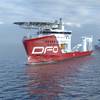Standard & Poor's affirmed its single-'B'-plus corporate credit rating and single-'B'-minus subordinated debt rating on Friede Goldman Halter Inc. (FGH). The outlook remains negative.
The ratings affirmation follows FGH's announcement that it has signed a definitive agreement to sell its vessel repair unit to Bollinger Shipyards Inc. (unrated) for $80 million. Proceeds from the all-cash transaction, which is expected to be completed in July 2000, will initially be used to reduce debt.
As a result, the transaction is expected to improve FGH's capital structure and liquidity, although the liquidity benefits of the transaction may be somewhat offset by a reduction in FGH's operating cash flow and committed bank credit lines.
Nevertheless, available bank credit, expected collection of an additional $33 million in tax refunds, and future non-core asset sales should be sufficient for near-term debt service and working capital needs.
The ratings for FGH reflect the company's participation in the intensely competitive and deeply cyclical shipyard and engineering services industries and aggressive debt leverage. FGH's yards and engineering divisions service drilling rigs and small marine craft used by commercial, government, and energy customers.
Although the offshore oilfield services market is experiencing a nascent recovery following a very deep downturn in 1998 and 1999, margins for the shipyard industry likely will be slow to recover in the near term because of excess industry capacity.
Declining activity is reflected in FGH's backlog, which totaled $543 million at March 31, 2000 versus $660 million (adjusted for subsequent asset sales) as of Dec. 31, 1999.
Approximately 73% of FGH's 1999 year-end backlog is expected to be completed in 2000.
Indicative of competitive pressures, the company's poor execution on awarded rig construction contracts, and the quality of the backlog, FGH's margins during the first quarter of 2000 fell to a dismal 3.2%.
Improvement in margins is expected from lower general and administrative expenses, which is projected to be $60 million in 2000 versus about $86.2 million in 1999.
Following the sale of the repair business, FGH will remain highly leveraged, with pro forma total debt to total book capitalization at March 31, 2000 of 49% and total debt to annualized earnings before interest, taxes, depreciation, and amortization (EBITDA) of about 4.6 times (x).
EBITDA interest coverage is expected to remain thin, averaging near 1.5x.
Capital spending and working capital needs are expected to outstrip cash flow over the near term.
FGH currently is in compliance with all bank credit facility covenants, but continued poor financial performance could trigger violations over the intermediate term.
Sponsored Content
ALMACO Group Completes Extensive Refurbishment on The Aroya

March 2025
 Read the Magazine
Read the Magazine

 Read the Magazine
Read the Magazine
This issue sponsored by:

Securing the Deep: Business Opportunities in Subsea Defense
Subscribe for
Maritime Reporter E-News
Maritime Reporter E-News is the maritime industry's largest circulation and most authoritative ENews Service, delivered to your Email five times per week









